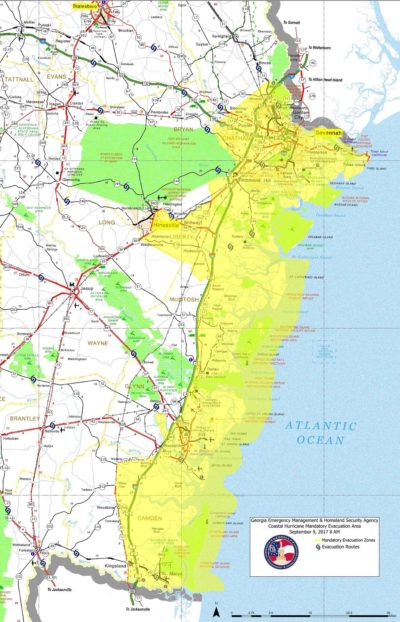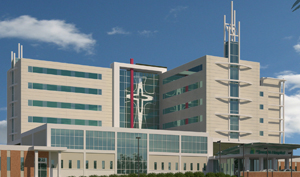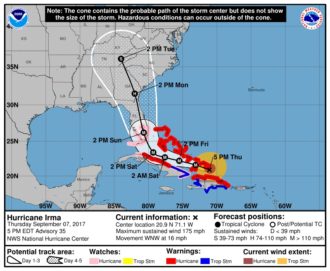Hospitals and nursing homes in coastal Georgia began to evacuate some patients Thursday, ahead of potential devastation from Hurricane Irma.
While some patients are being evacuated, others will be “sheltered in place,’’ said Adrianne Feinberg, director of emergency preparedness for the Georgia Hospital Association.

Feinberg told GHN that Friday would be a critical day to transport patients from coastal facilities. EMS, ambulances and buses will help with the transfers. “Some patients are leaving now; more are leaving tomorrow.”
“This storm could be potentially more devastating’’ than Hurricane Matthew in 2016, Feinberg said. “We learned a lot from that.”
It’s the second time in less than a year that a hurricane has forced patient evacuations in Georgia. Last October, with Hurricane Matthew bearing down on Georgia, both campuses of Southeast Georgia Health System (SGHS) – in Brunswick and St. Marys – moved all 190 patients to other hospitals in the state prior to the storm’s arrival. The SGHS hospitals are in low-lying areas near the sea.
The St. Marys and Brunswick patients left via EMS transport and air evacuation to 16 hospitals, including those in Macon, Albany and Augusta.
The Georgia Health Care Association, which represents nursing homes, said “multiple’’ facilities in coastal Georgia began evacuation processes Thursday ahead of Irma, which is bearing down on the southern end of Florida but could still turn in a different direction.

Irma is the most powerful Atlantic storm on record and has devastated some Caribbean islands. Americans as a whole are watching the storm closely after Hurricane Harvey caused unprecedented flooding in coastal Texas less than two weeks ago.
Gov. Nathan Deal expanded the state of emergency regarding Hurricane Irma across 30 Georgia counties, after a recommendation from several agencies.
Additionally, Deal issued a mandatory evacuation order Thursday for all areas east of I-95, all of Chatham County (home of Savannah) and some areas west of I-95 that could be impacted by potential storm surge from Hurricane Irma.
Memorial Health, which operates a large safety-net hospital in Savannah, said Thursday afternoon that it was “currently in the process of evacuating our sickest patients.’’
And St. Joseph’s/Candler, another system in the city, said it planned to close one of its two hospitals, Candler Hospital, during the storm and consolidate operations into St. Joseph’s Hospital.
Feinberg of GHA said that “when we need to place people, we can find an appropriate bed in a different area of the state,’’ she added.
That’s part of the regional coordinating hospital system created before Hurricane Matthew hit. When the system kicked in in last year, it helped transport patients to facilities in Albany, Waycross and Tifton.
Dr. Patrick O’Neal, interim commissioner of the Georgia Department of Public Health, told GHN recently that Public Health’s response to last year’s hurricane “superb, for the most part,” It was the first time hospital patient evacuations occurred in many years in Georgia, he said. The previous such evacuation had led to seven deaths, he said.
“We did not lose a single person related to the [Matthew] evacuation,” O’Neal said.
St. Joseph’s/Candler cited the “uncertainty of the force of this storm’’ in explaining its decision to consolidate operations to St. Joseph’s Hospital. “With the recent upgrades to that facility, it is better equipped to handle the long term needs of our caregivers, medical staff and any patients who are too sick to be discharged or evacuated,” the system said in a statement.
The newly renovated St. Joseph’s Hospital is now one of the strongest buildings in Savannah capable of withstanding significant hurricane force winds, hospital officials said. “In addition, it can run emergency power to the entire 330-bed building for a longer period of time. This includes the ability to air condition all patient areas and surgical suites.”

Patients at both St. Joseph’s Hospital and Candler Hospital are currently being evaluated to determine who can be evacuated to an inland hospital for care during the storm, officials said. “Those patients who cannot be discharged or evacuated will be moved to St. Joseph’s Hospital. Babies in the Special Care Nursery (NICU) will be evacuated.”
Some patients, because of the acuteness of their illness, may not be able to evacuate and will shelter in place. “Each facility, each clinical staff will make those decisions,” Feinberg said.

Devon Bacon, of the Georgia Health Care Association, said in a statement that “as soon as we became aware of the impending nature of Hurricane Irma, Georgia’s skilled nursing centers began to review and activate the emergency plans they have in place in accordance with state and federal regulations. Centers on or near the coast are maintaining constant contact with centers they have partnered with to receive residents in the event of an evacuation, as well as any other partners they would work with during an evacuation.”
In Florida, hospitals in the state’s southernmost county have put their own evacuation plans into motion, CNN reported.
The three hospitals in Monroe County, which includes the Keys, are in the process of shutting their doors ahead of Irma’s expected Sunday arrival. The county has also ordered a mandatory evacuation for residents.

